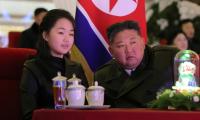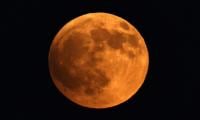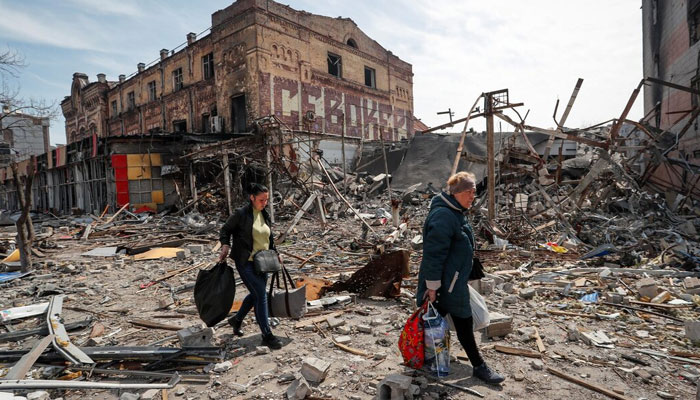No one wins a war
The West has been busy arming Ukraine instead of making any sincere efforts to douse the flames
Despite the massive destruction caused by the Ukrainian conflict, there seems to be no respite for the Russians and Ukrainians. Both sides continue to lose soldiers and civilians but the ruling elites in the two countries don’t seem to be realizing the gravity of the situation. Both are adamant they will win but the bitter reality of war is that there are no victors.
The recent anti-Russia and anti-China rhetoric by G7 leaders and statements of Russian President Vladimir Putin clearly indicate that no party is interested in peace. The West has been busy arming Ukraine instead of making any sincere efforts to douse the flames of the war while Moscow continues playing havoc with the lives of Ukrainians. The conflict has killed tens of thousands of Russians and Ukrainians besides forcing millions to flee conflict zones. The insanity of war has also caused destruction worth over $50 billion besides creating a spectre of more escalation.
It seems the G7 has a dogged determination to infuriate Russia. The group reaffirmed its commitment to support Ukraine “for as long as it takes”. A final statement from the summit in Italy amounts to further provoking Moscow because the leaders of G7 affirmed their plan to finance a $50 billion loan for Kiev in this statement. This loan is going to be granted from “extraordinary revenues” extracted from frozen Russian assets.
The leaders believe the move would send an “unmistakable signal” to Vladimir Putin as the war rages on. Ukrainian President Volodydmyr Zelenskyy hailed the plan as a “vital step forward in providing sustainable support for Ukraine in winning this war”. Kiev is likely to have this whopping amount before the end of this year.
But the plan has incensed the Russian leadership and, contrary to the expectations of Western leaders and the Ukrainian president, the plan is likely to intensify the heat of war. Moscow’s reaction clearly indicates that such a plan would not be tolerated by the second biggest military power of the world. Putin has condemned the freezing of Russian assets as “theft” and vowed it “will not go unpunished”.
This all seems to be further fanning the flames of the war. It is unfortunate that Putin and Western leaders are unable to anticipate the conflagration that this possible escalation could trigger. Some Western think tanks are trying to exacerbate the conflict by pushing for more war fronts to be opened up, without realizing that this could not only drag many other states into a terrible conflict but might turn out to be a global destruction which would be uncontrollable. It is not clear which third front – after Ukraine and Palestine – these Western think tanks want to be opened but the G7 leaders lambasting China for helping Russia could be a sign.
The West has trade issues with China. Following market logic, the communist country has started mass production of electrical vehicles. Western countries are unable to compete with China, accusing Beijing of showering subsidies on Chinese companies that are giving a tough time to Western industrial entities. However, the fact is that China is not the only country extending subsidies; many Western countries including the US also do the same in one form or another. For instance, former American president Donald Trump drastically reduced taxes to encourage American companies to produce or manufacture goods at home.
But companies have no nationalities. Capital knows no boundaries. It moves wherever it gets profit. During the 1980s, it travelled to China to satiate its voracious greed for profit and now it is making inroads into Vietnam and Bangladesh.
The G7 leaders should realize that there is no point in trying to turn trade issues into political ones. If the West has trade problems with China, they should be addressed in the framework of the World Trade Organization. There could be a number of forums where these grievances of the West could be addressed and settled. Linking such issues with a military confrontation is not prudent and will unnecessarily drag other powers into the Ukrainian conflict. This would be catastrophic not only for Russians and Ukrainians but for the people of Western, Central and Eastern Europe as well given their proximity to the conflict zone.
For now, it seems that Putin is adamant in retaining the occupied territories while Ukraine seems to be determined to become a member of Nato. What Moscow needs to realize is that small states will always be concerned about their security, especially if they have a powerful state next door.
Moscow needs to understand that its hegemonic attitude towards Georgia and other former communist states created apprehensions about the rise of an irredentist Russia. Moscow needs to ensure that smaller or militarily less powerful states in its backyard are free from any fear of invasion. It needs to give up its hegemonic style that cannot be acceptable in a rules-based world.
The Russian leadership should also realize that borders of modern states cannot be altered with military might. During the time of the Czar and the Soviet Union many Russians moved into Central Asian and other former communist states. Their safety and protection is important but this is something that can be worked out through talks and negotiations. Invading a sovereign country using the pretext of Russians’ protection or invoking some historical situations cannot be endorsed by international bodies and the global community.
Therefore, Russia needs to give up its claim over Ukrainian territories. It must work to withdraw its troops from those areas and hold out concrete assurances that such a course will never be undertaken in the future. Moscow might need to enter into agreements with other countries in its background, categorically stating that it respects their territorial integrity and considers them equal. A no-war pact with all former Soviet socialist republics might go some way in allaying their fears regarding a possible Russian invasion.
Ukraine ought to give up its plan to obtain Nato membership. The former USSR did not attack Sweden and other states after entering into agreements. It is prudent for Kiev to enter into the same agreements with Russia. Kiev needs to realize that Russia faced the Polish-Lithuanian CommonWealth, Napoleon, the invasion of allied countries during World War I and Hitler during World War II. Some of Russia’s security concerns might be genuine which could be discussed and understood.
The West should unfreeze Russian assets because this amounts to breaching the trust that Moscow reposed in Western banks. Such Western action would deter other countries from trusting the Western banking system. Russia has suffered financially because of the conflict and the Western sanctions. The unfreezing of Russian assets could be the first step towards confidence-building measures. A halt to Russian and Ukrainian attacks should be another step.
Efforts should be made to secure a brief ceasefire which could provide the UN enough time to organize an international conference on the issue. No such conference could be successful without inviting China and Russia. Therefore, the West must take Beijing, Moscow and Kiev on board if it really wants to come up with any sustainable solution to the conflict. The West arming Ukraine or Russia hurling threats will not help.
The writer is a freelance journalist who can be reached at: egalitarianism444@gmail.com
-
 Claude Still Down? Latest Updates On Outage
Claude Still Down? Latest Updates On Outage -
 Watch: Nancy Guthrie's Suspect Break His Silence After Being Dubbed Masked Kidnapper
Watch: Nancy Guthrie's Suspect Break His Silence After Being Dubbed Masked Kidnapper -
 'Deadliest Catch' Star Dies In Tragic Incident At 25
'Deadliest Catch' Star Dies In Tragic Incident At 25 -
 Kawhi Leonard Earns All-NBA Praise From Zach Lowe After Clippers Turnaround
Kawhi Leonard Earns All-NBA Praise From Zach Lowe After Clippers Turnaround -
 Nuggets Vs Jazz: Jamal Murray’s 45 Points Power Denver Past Utah
Nuggets Vs Jazz: Jamal Murray’s 45 Points Power Denver Past Utah -
 Justin Timberlake Moves To Block Release Of Body Cam Footage From DWI Arrest
Justin Timberlake Moves To Block Release Of Body Cam Footage From DWI Arrest -
 Kim Jong Un’s Future Under Speculation: Could His Daughter Lead North Korea?
Kim Jong Un’s Future Under Speculation: Could His Daughter Lead North Korea? -
 Nancy Mace Under Investigation By House Ethics Panel For Alleged Overcharges
Nancy Mace Under Investigation By House Ethics Panel For Alleged Overcharges -
 'Sinners' Star Jayme Lawson Calls Out BAFTA Organisers For Exploiting Tourette's Advocate
'Sinners' Star Jayme Lawson Calls Out BAFTA Organisers For Exploiting Tourette's Advocate -
 Lauren Boebert Gets Yelled At By Hillary Clinton Over Leaked Photo During Epstein Deposition
Lauren Boebert Gets Yelled At By Hillary Clinton Over Leaked Photo During Epstein Deposition -
 Is It A Full Moon Tonight? NASA Says Blood Moon Will Light Up Canada
Is It A Full Moon Tonight? NASA Says Blood Moon Will Light Up Canada -
 Priyanka Chopra Reveals Why Her Late Dad Would Have 'loved' Nick Jonas
Priyanka Chopra Reveals Why Her Late Dad Would Have 'loved' Nick Jonas -
 US Embassy In Riyadh Hit By Drones As Fire Breaks Out In Diplomatic Quarter
US Embassy In Riyadh Hit By Drones As Fire Breaks Out In Diplomatic Quarter -
 Sean ‘Diddy’ Combs Set For Early Prison Release Amid Appeal
Sean ‘Diddy’ Combs Set For Early Prison Release Amid Appeal -
 Zendaya's Mom Breaks Silence Over Tom Holland Wedding Confession
Zendaya's Mom Breaks Silence Over Tom Holland Wedding Confession -
 Dax Shepard Set To Make Shocking Revelation About Childhood Sexual Abuse In New Memoir
Dax Shepard Set To Make Shocking Revelation About Childhood Sexual Abuse In New Memoir




